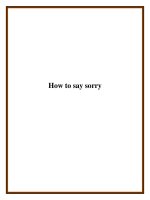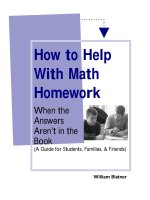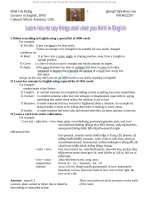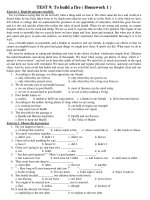1 how to say s, es homework 1 (1) huân
Bạn đang xem bản rút gọn của tài liệu. Xem và tải ngay bản đầy đủ của tài liệu tại đây (63.02 KB, 8 trang )
1-watch video number 3
2-learn 3 ways of pronouncing
/s/,/z/,/iz/+ EXAMPLES
by heart
3-do practice 1,2,3
4-reading: highlight words ended S, ES
3- />
HOW TO PRONOUNCE S/ES IN ENGLISH
Phonetics =phiên âm
1. Âm s và es được phát âm là /ɪz/ (hoặc âm /əz/)
Ví dụ cụ thể với những trường hợp được phát âm là /ɪz/:
/ʃ/, /tʃ/, /z/,/dʒ/,/s/,/ks/ unvoiced consonants
/ʃ/dish->dishes /dɪʃiz/
/tʃ/ church->churches /tʃɜːtʃiz/
/z/pause->pauses /pɔːziz/
/dʒ/judge->judges /dʒʌdʒiz/
/s/ nurse->nurses /nɜːrsiz/
/ks/ hoax->hoaxes/həʊksiz/
CE: races / reisiz /
S: pauses, nurses, buses, rises
X: fixes, boxes, hoaxes
Z: amazes, freezes, prizes, quizzes
SS: kisses, misses, passes, bosses
CH: churches, sandwiches, witches, teaches
SH: dishes, wishes, pushes, crashes
GE: garages, changes, ages, judges
Watches / wɒt∫iz/: xem
Washes /wɒ∫iz/: rửa
Changes /t∫eindʒiz/: thay đổi
Wishes /ˈ
wɪʃ·iz/: ước
Miss /mɪsiz/: nhớ
2. Phát âm là /s/ Thời phong kiến Fương tây
/p/, /k/, /f/, /t/, /θ/
/p/sleep->sleeps /sliːps/
/k/book->books /bʊks/
/f/belief->beliefs /bɪˈ
liːfs/
/t/ write->writes /raɪts/
/θ/tablecloth->tablecloths /ˈ
teɪblklɒθs/
Ví dụ cho những từ kết thúc được đọc bằng âm /s/
P: cups, stops, sleeps
T: hats, students, hits, writes
K: cooks, books, drinks, walks
F: cliffs, sniffs, beliefs, laughs, graphs (phụ âm “-gh” và “ph” ở đây được phát âm như F)
TH: myths, tablecloths, months (âm vô thanh “th”)
Stuffs /stʌfs/: vật liệu
Roofs /ruːfs/: mái nhà
Books /bʊks/: sách
Kicks /kiks/: cú đá
Taps /tỉps/: vịi nước
Maps /mỉps/: bản đồ
Streets /stri:ts/: đường phố
Nets /nets/: tấm lưới
Laughs /læfs/: cười
Coughs /kɒfs/: tiếng ho
3. Phát âm là âm /z/: voiced consonants + words ending
VOWEL
cho những âm khơng đọc là /s/ /ɪz/
Ví dụ cho những từ kết thúc được đọc bằng âm /z/:
Nguyên âm: sees, fleas
D: cards, words, rides, ends
G: rugs, bags, begs
L: deals, calls, falls, hills
M: plums, dreams
N: fans, drains, runs, pens
NG: kings, belongs, sings
R: wears, cures
V: gloves, wives, shelves, drives
Y: plays, boys, says
Kết thúc bằng THE là hữu thanh thì đọc là /z/: clothes,
bathes, breathes
PRACTICE 1
I. Chọn từ có cách phát âm khác với các từ còn lại
1. A.
coughs
2. A.
signs
B.
sings
C. stops
D. sleeps
B. profits
C. becomes
D. survives
3. A.
walks
4. A.
wishes
B.
steps
C. shuts
D. plays
B. practices
C. introduces
D. leaves
B.
stretches
C. comprises
D. potatoes
B. maps
C. plants
D. chairs
5. A.
grasses
6. A.
desks
7. A. pens
B. books
C. phones
D. tables
8. A. dips
B.
deserts
C. books
D. camels
attends
C. drifts
D. glows
develops
C. values
D. equals
classmates
C. amuses
D. attacks
9. A. miles
B.
10. A.
B.
mends
11. A.
B.
repeats
12. A.
B.
humans
13. A.
B.
manages
14. A. dishes B.
15. A. fills
B.
16. A. wants B.
17. A. books B.
18. A.
B.
biscuits
19. A. knees B.
20. A. cups B.
21. A. houses B.
22. A. schools B.
23. A.
B.
names
24. A.
B.
nights
25. A. pens B.
26. A.
B.
shakes
27. A. horse B.
28. A. faces B.
29. A.
B.
president
30. A.
B.
sweets
oranges
adds
books
dogs
C.
concerts
C.
photographs
C. experiences
C. stirs
C. stops
C. cats
magazines
C. newspapers
D. vegetables
peas
stamps
faces
yards
C.
C.
C.
C.
D.
D.
D.
D.
lives
C. dances
D. tables
days
C. years
D. weekends
markers
C. books
D. rulers
nods
C. waves
D. bends
tools
houses
C. house
C. horses
D. chairs
D. passes
busy
C. handsome
D. desire
watches
C. dishes
D. boxes
dreams
laughs
trees
books
hates
labs
D. songs
D. makes
D.
D.
D.
D.
chores
lets
sends
maps
niece
pens
places
seats
PRACTICE 2
I. Chọn từ có cách phát âm khác với các từ còn lại
1. A.misses B.stops
C.teaches
D.rises
2. A.plays B.smells
C.cooks
D.boils
3. A.watches B.hits
C.snacks
D.prevents
4. A.comes B.appears C.boils
D.washes
5. A.commands B.turns C.cuts
D.schools
6. A.trains B.stamps
C.mans
D.closes
7. A.buses B.boxes
C.eats
D.watches
8. A.caps B.bags
C.stops
9. A.exists B.claims
C.warns
10. A.hopes B.looks
C.cuts
11. A.meets B.shops C.trucks
D.wants
D.lives
D.stays
D.goods
12. A.inventions B.lives C.kicks
D.knows
13. A.coughs B.figures C.bosses
D.wishes
14. A.finds B.mouths
D.chips
C.mopes
15. A.sings B.speaks C.gains
D.opens
16. A.soups B.cuts
D.wreaths
C.boys
17. A.laughs B.misses C.ploughs
D.signs
18. A.engages B.strikes C.paths
D.mopes
19. A.reaches B.watches C.girls
D.teaches
20. A.works B.begins
D.shops
PRACTICE 3
C.develops
Choose the word whose underlined part is pronounced differently
from the others
1. A. skims B. works C. sits D. laughs
2. A. fixes B. pushes C. misses D. goes
3. A. cries B. buzzes C. studies D. supplies
4. A. holds B. notes C. replies D. sings
5. A. keeps B. gives C. cleans D. prepares
6. A. runs B. fills C. draws D. catches
7. A. drops B. kicks C. sees D. hopes
8. A. types B. knocks C. changes D. wants
9. A. drinks B. rides C. travels D. leaves
10. A. calls B. glasses C. smiles D. learns
11. A. schools B. yards C. labs D. seats
12. A. knives B. trees C. classes D. agrees
13. A. buses B. horses C. causes D. ties
14. A. garages B. boats C. bikes D. roofs
15. A. ships B. roads C. streets D. speaks
16. A. beliefs B. cups C. plates D. apples
17. A. books B. days C. songs D. erasers
18. A. houses B. knives C. clauses D. changes
19. A. roofs B. banks C. hills D. bats
20. A. hats B. tables C. tests D. desks
21. A. gives B. passes C. dances D. finishes
22. A. sees B. sings C. meets D. needs
23. A. seeks B. plays C. gets D. looks
24. A. tries B. receives C. teaches D. studies
25. A. says B. pays C. stays D. boys
26. A. eyes B. apples C. tables D. faces
27. A. posts B. types C. wives D. keeps
28. A. beds B. pens C. notebooks D. rulers
29. A. stools B. cards C. cabs D. forks
30. A. buses B. crashes C. bridges D. plates
Luyện Tập Phát Âm S Và ES
Sau khi nắm được cách phát âm s và es rồi thì bạn hãy thực hành
với 3 đoạn văn ngắn sau đây. Bạn chỉ cần chọn 1 trong 3 đoạn
văn này, luyện tập thật thành thạo rồi hãy chuyển qua đoạn khác.
Chú ý là bạn phải đọc nhấn nhá cả âm điệu, cách nối âm mà
không chỉ mỗi cách phát âm s và es.
Seasons
Between the months of November and May a wind blows from
the west in most parts of Indonesia. It comes from the ocean and
carries rain. Clouds build up around the mountains, and every
afternoon rain falls.
The rain is always heavy, and rivers that can be walked across in
the dry season now become dangerous. When it rains the whole
day, they may suddenly overflow and cause great damage to the
land.
Most farmers are glad when wet season begins. There is water for
their fields and they can again start growing rice. But people in
town are not so glad because the streets soon get muddy and
dirty. They prefer the dry season when they can sit outside and
enjoy the cool evenings.
Learning English
Every year students in many countries learn English. Some of
these students are young people, other are teenagers. Many are
adults. Some learn at school, others study by themselves. A few
learn English just by hearing the language in film, on television, in
the office or among their friends. But not many are lucky enough
to do that. Most people must work hard to learn another language.
Many boys and girls learn English at school because it is one of
their subjects. They study their own language, mathematics and
English. In England, America and Australia may boys and girls
study their own language, which is English, and mathematics and
another language, perhaps French, German or Spanish.
Many adults learn English, because it is useful for their work.
Teenagers often learn English for their higher studies, because
some of their books are in English at the college or university.
Other people learn English because they want to read newspapers
or magazines in English.
David and Rosa’s
Day David is a bank manager and Rosa is a doctor in a large
hospital. David gets up at 7.30 am and has a bath. He leaves
home at 8.30 and goes to work by car. He arrives at the bank at
9.00.
Rosa gets up at 9.30 because she doesn’t start work until 1.00 in
the afternoon. She catches the bus to the hospital at 12.15.
David finishes works at 5.30 and goes shopping in the
supermarket near the bank. Then he goes home and cooks dinner.
He eats alone in the kitchen at 7.00 and then usually watches TV
in the living room until Rosa arrives home at 10.00. She often has
her diner in front of the TV. David goes to bed at 11.00, but Rosa
usually goes to bed at 11.30.









